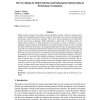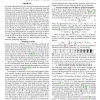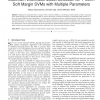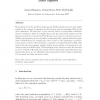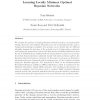136
click to vote
TNN
2010
14 years 8 months ago
2010
Abstract--A crucial issue in designing learning machines is to select the correct model parameters. When the number of available samples is small, theoretical sample-based generali...
106
click to vote
JMLR
2010
14 years 8 months ago
2010
Model selection strategies for machine learning algorithms typically involve the numerical optimisation of an appropriate model selection criterion, often based on an estimator of...
128
click to vote
ICIP
2010
IEEE
15 years 1 days ago
2010
IEEE
An image representation framework based on structured sparse model selection is introduced in this work. The corresponding modeling dictionary is comprised of a family of learned ...
134
click to vote
CVPR
2010
IEEE
15 years 2 days ago
2010
IEEE
Our goal is to fit the multiple instances (or structures) of a generic model existing in data. Here we propose a novel model selection scheme to estimate the number of genuine str...
124
click to vote
COLT
2010
Springer
15 years 3 days ago
2010
Springer
We analyze the regret, measured in terms of log loss, of the maximum likelihood (ML) sequential prediction strategy. This "follow the leader" strategy also defines one o...
110
click to vote
BMVC
2010
15 years 3 days ago
2010
Man-made environments are abundant with planar surfaces which have attractive properties and are a prerequisite for a variety of vision tasks. This paper presents an incremental m...
128
click to vote
PAMI
2010
15 years 14 days ago
2010
—Adapting the hyperparameters of support vector machines (SVMs) is a challenging model selection problem, especially when flexible kernels are to be adapted and data are scarce....
139
click to vote
ML
2010
ACM
15 years 15 days ago
2010
ACM
Abstract Clustering Stability methods are a family of widely used model selection techniques for data clustering. Their unifying theme is that an appropriate model should result in...
125
click to vote
MA
2010
Springer
15 years 15 days ago
2010
Springer
Model selection by the predictive least squares (PLS) principle has been thoroughly studied in the context of regression model selection and autoregressive (AR) model order estima...
121
click to vote
IJAR
2010
15 years 16 days ago
2010
We consider the problem of learning Bayesian network models in a non-informative setting, where the only available information is a set of observational data, and no background kn...

